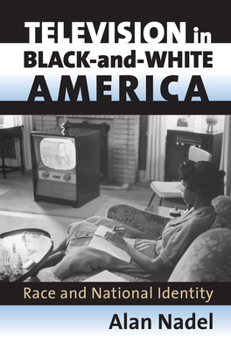Television in Black-And-White America: Race and National Identity
(Part of the CultureAmerica Series)
Select Format
Select Condition 
Book Overview
Alan Nadel's provocative new book reminds us that most of the images on early TV were decidedly Caucasian and directed at predominantly white audiences. Television did not invent whiteness for America, but it did reinforce it as the norm--particularly during the Cold War years. Nadel now shows just how instrumental it was in constructing a narrow, conservative, and very white vision of America.
Nadel depicts a time when television effectively hijacked and monopolized the nation's vision of itself to create a virtual but severely distorted civic space. On Cold War TV's three channels there were no double beds, no liberated housewives, no social criticism, and no homosexuality. And the few available black faces overwhelmingly belonged to athletes, musical entertainers, and actors playing menial roles. Even America's beloved Walt Disney promoted his highly popular TV and theme-park versions of society as utterly homogeneous representations of reality.
During this era, prime-time TV was dominated by "adult westerns," with heroes like The Rebel's Johnny Yuma reincarnating southern values and Bonanza's Cartwright family reinforcing the notion of white patriarchy--programs that, Nadel shows, bristled with Cold War messages even as they spoke to the nation's mythology. America had become visually reconfigured as a vast Ponderosa, crisscrossed by concrete highways designed to carry suburban white drivers beyond the moral challenge of racism and racial poverty and increasingly vocal civil rights demands.
Television in Black-and-White America revisits a time and space that some might miss for its simplicity and relative innocence. Nadel, however, entreats us to look beyond such nostalgia to see how, even in its earliest days, television had already become a powerful mediator of social norms that both controlled and warped our sense of reality.





